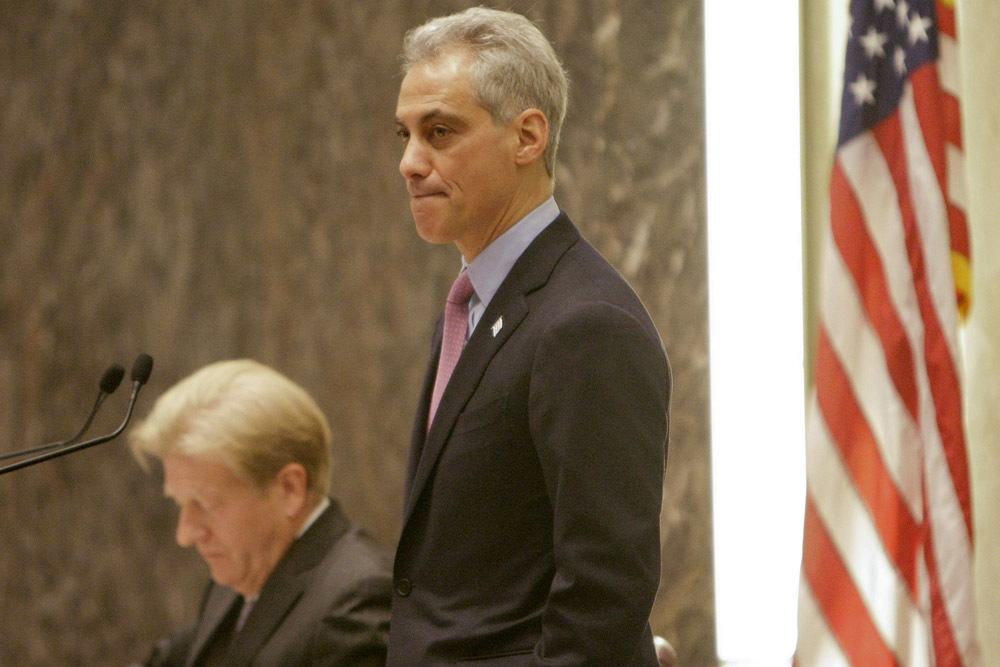Neither triple downgrades in Chicago’s credit rating nor data showing the city is in worse debt shape than bankrupt Detroit could stop the Chicago City Council from doing what it’s done for decades—borrow huge sums of money with little discussion or apparent thought.
Two days after Mayor Rahm Emanuel announced a plan to borrow another $1.9 billion, and with almost no discussion, the City Council this week voted 43-4 to approve the plan. Emanuel gave little information about how the money would be used, other than to say about $1 billion would go for Midway Airport, with the rest refinancing old debt and covering huge legal settlements the city must pay for police misconduct and other lawsuits.
“The city has been spending more than it takes in for years and borrowing to make up the difference. And if you compare Detroit to Chicago on this score, Chicago actually looks much worse, not better, than Detroit,” said Bill Bergman, director of research for StateDataLab.org, a project of the Illinois-based Institute for Truth in Accounting.
Truth in Accounting last year analyzed assets versus liabilities for Chicago, Cook County (which includes Chicago), and the State of Illinois. It determined the total “taxpayer burden” for Chicago households is roughly $67,000 ($18,000 for Chicago, $10,000 for Chicago-related Cook County taxing districts, and $39,000 for the state). This compares with a total state-local taxpayer burden of roughly $61,000 for Detroit households.
‘A Derelict City Council’
The Chicago Tribune also points to dangerous parallels between the two cities. In a Feb. 5 editorial headlined “Chicago is on the road to Detroit,” the editors wrote:
“By the most recent numbers, Mayor Rahm Emanuel’s government owes $13.9 billion in general obligation bond debt, plus $19.5 billion in unfunded pension obligations. Add in Chicago Public Schools and City Hall’s other ‘sister agencies’ and you’re talking billions more in debts that Chicago taxpayers owe. Yet here we are on a Wednesday when the mayor probably will get approval from a derelict City Council to issue another up-to-$900 million in bonds backed by property taxes—and to double, to $1 billion, the amount of short-term bank money his administration can borrow to raise cash.
“Tuesday’s Tribune reported that, despite a lack of particulars on the costs or types of projects the bond proceeds would fund, this huge new borrowing package on Monday flew through the council’s Finance Committee. Most of the questions from aldermen centered on whether the financial firms executing the deals are employing enough minorities. ‘These transactions are the largest opportunities for people to make money off the government, and so we want to make sure everybody is included,’ said Ald. Walter Burnett, 27th. ‘It’s a lot of money. It’s enough for everybody.'”
False Balanced-Budget Claims
Truth in Accounting’s Bergman said Chicago city leaders “regularly claim to ‘balance the budget’ according to state law, even though they spend more than they take in every year. We think the city should overhaul its budgeting and financial reporting practices, with ‘F.A.C.T-based budgeting’ [Full Accrual Calculations and Techniques] a model for a solution.”
At the Illinois Policy Institute, which has an office in Chicago, Senior Budget and Tax Policy Analyst Ben VanMetre said, “The skyrocketing property taxes used to prop up this debt are quickly forcing people out of the city.”
Just two weeks before the City Council approved this extra $1.9 billion of borrowing, Crain’s Chicago Business reported, “Next year, Chicago must come up with a state-mandated $590 million increase in its contribution to police and fire pension funds. A Crain’s analysis of the city’s tax and budget options shows that payment could lead to the highest commercial property tax rate in the nation and still leave the city needing to make millions of dollars in spending cuts that could decimate many services.”
Much of this new round of borrowing appears to be aimed at dealing with that short-term problem, but money borrowed now must be paid back later with interest.
“Government officials in Chicago are looking to bury the city even further in debt with an additional $1.9 billion dollars in new borrowing. Taxpayers should be worried,” Van Metre said.
Last July Moody’s Investors Service hit Chicago with an unprecedented triple-level drop in the city’s credit rating. The credit rating agency cited Chicago’s “very large and growing” pension liabilities, “significant” debt service payments, and “unrelenting public-safety demands” to explain the move. Last November, Fitch Ratings likewise hit the city with a triple downgrade.
Unanswered Questions
Chicago Chief Financial Officer Lois Scott in February told Finance Committee members she did not know how much more the city will have to pay in higher interest costs, as this would be the city’s first debt issuance since the downgrade. But last fall she told aldermen the city could have to pay another $1 million a year for every $100 million borrowed.
“We’ve been voting on a lot of these bond issues not knowing specifically what we’re voting on, and that’s what we’re trying to get today,” 32nd Ward Ald. Scott Waguespack told reporters after the Finance Committee voted to recommend approval. “Tell us exactly what we’re spending this money on. They’ve given us some specific numbers, but not specific tasks, projects, or equipment that they’re spending it on.”
Waguespack was one of the four aldermen who voted against the borrowing.





